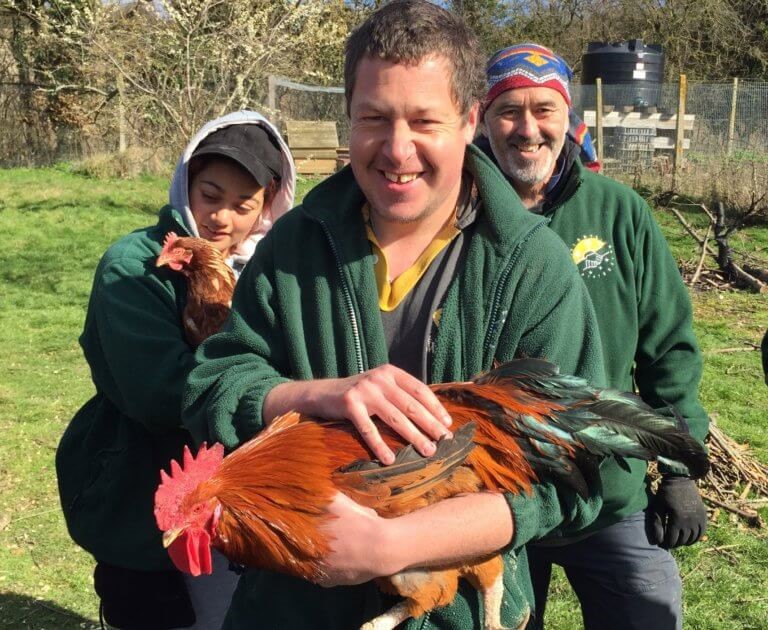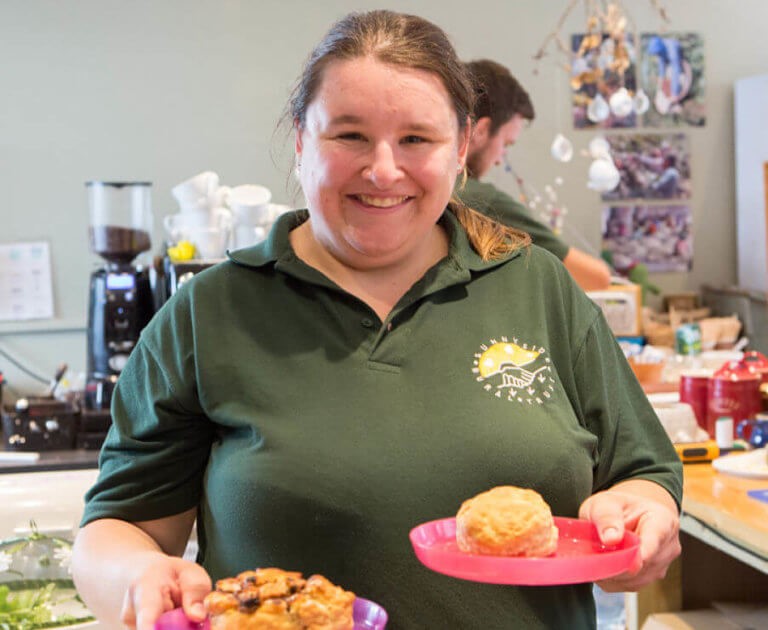Sunnyside Rural Trust

Sunnyside Rural Trust is based in Dacorum and its primary aim is supporting young people and young adults with learning disabilities through skills development and helping them into employment. A significant part of their income is received directly and indirectly from Hertfordshire County Council’s social care budget. Many individual beneficiaries pay to attend Sunnyside from their individual budgets and direct payments. Some are paid for as a day service by private care providers and some individuals pay privately if they are not eligible for statutory care funding.
However, this description misses out how they operate and the wider impacts they create of building communities, generating local economies and providing ethical products that members of the public can buy – helping to support Sunnyside’s ethos.
Sunnyside runs a horticulture service, providing a bedding plant nursery, independent greengrocer, farms shops and a café. The products are sold to the public and they also have contracts with local councils and commercial horticulturalists. They also run a community warden service to help keep communities safe and identify where potential problems might be.

An example of the impact of the farm activity starts with 350 rescue hens. Caring for the flock is one of the therapeutic employment activities and this produces fresh organic eggs that are sold in the shop. The chickens live in the orchard and this helps to fertilise the trees which produce apples and other fruit that are made into juice, jams and chutneys which are also sold. They also keep bees and produce 2000 pounds of honey each year.
Chief Executive Keely Siddiqui Charlick describes how Sunnyside communicates the wider impact of this work.
“We want you to buy products that you want and need and at the same time there are other services and products that you’re buying, for example if you buy your organic fresh eggs you know the provenance, you get quality assurance and faith in the product. You’re supporting a charity without giving a donation, you are keeping your money in the local economy and you are providing an opportunity for someone from your community.”
She compares this with buying from a supermarket
“Where you money goes out of the area and doesn’t impact on any single human being apart from a shareholder in Luxembourg. [We are] trying to make it realistic so someone doesn’t think ‘I am just buying eggs’ but that your apple juice, your veg box, your eggs your garden service [means] your life will be better. Because your economy will be better, there will be more tax money to go round. By helping us you are helping yourself and others. It is a win-win situation.”
Sunnyside’s wardens also offer greater value to the parish councils that commission the service. Previously the tasks of picking up litter and identifying and reporting hazards and vandalism were part of a large contract and the parishes did not feel that they were getting a good service. Now they buy directly from Sunnyside and they recruit a local person with a learning disability who patrols six days a week. They build relationships with local people and this increases the sense of community as well as creating a job and providing a better and more responsive service.
Creating opportunities for individuals is at the heart of what Sunnyside is seeking to achieve. Keely says:
“I can see the change in people all the time from a person with a learning disability who you could map out their life in two seconds – you are going to stay at home with your mum and dad until you’re about sixteen. Mum and dad are going to die, you are going into care you will get depression – you can literally plot someone’s life. But we say to someone you can be an amazing barista.”
One of the trainees is a great example of the changes that Sunnyside makes.
“This was person was awesome and made good quality coffee. She is now our head barista in our café. She isn’t living with her parents any more. She makes the perfect flat white time and time again. She is not on anti-depressants, she has a partner and a flat.”
Sunnyside has operated for thirty years as a charity and has been trading as Sunnyside Rural Trust for eight years. There are thirty members of staff, some of whom have a learning disability. The annual turnover of the business is just over £1million and they offer support to 130 individuals a week.
They are keen to evidence the impact they make and have calculated that in the last 7 years for every £1 spent by statutory organisations, they have saved £9. They estimate that they could save up to £3 million in care bills in the next five years. Keely believes that public sector commissioning should place greater value on the social impact they can create within these contracts.
Sunnyside has plans to expand the business to create more social impact. They are developing a new farm shop that will have an animal sanctuary attached and they have a new contract with Tom Stuart-Smith, a locally-based landscape designer, to supply him with plants for his commission to design a garden at Hampton Court.
“You need somewhere where people are looking for talent as opposed to thinking ‘how can I entertain you and stop you from being a problem. We look for work streams where someone with a learning disability is the perfect person to do it.”
